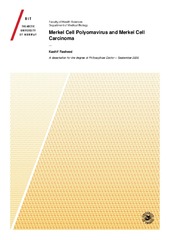Abstract
Merkel cell carcinoma (MCC) is a rare, highly aggressive neuroendocrine skin cancer. More than 80% of MCC have Merkel cell polyomavirus (MCPyV) clonally integrated into the human genome (VP-MCC) while the remaining 20% are virus negative (VN-MCC) but linked with chronic exposure to UV sunlight. MCC is particularly associated with immune suppression with 8-48 folds increase in incidence in immunosuppressive conditions. Another hallmark of VPMCC is expression of a truncated variant of one of MCPyV’s oncoproteins, i.e. large T-antigen. This thesis aims to study the role of the oncoproteins of MCPyV on inflammatory mediator regulation contributing to MCC development and on non-MCC tumor initiation and/or development. This knowledge will provide a better understanding of MCPyV-induced MCC, a prerequisite for developing novel therapeutic approaches. We have found that MCPyV fulllength large T-antigen inhibited while truncated large T antigen stimulated both early and late promoters activities of MCPyV. We have also observed that MCPyV oncoproteins upregulated CCL17/TARC and IL-33 expression in MCC. CCL17/TARC is a chemokine that helps in recruitment of regulatory T cells while IL-33 is IL-1 family member cytokine that creates immunosuppressive and pro-tumorigenic microenvironment, respectively. Human MCC tissues showed a strong staining of CCL17/TARC, CCR4, IL-33, ST2/IL1RL1 and IL1RAcP in both VP- and VN-MCC. Recent findings reported MCPyV co-infection with high-risk human papilloma virus (HR-HPV) -positive cervical cancers. We demonstrated that MCPyV oncoproteins also increase expression of HPV16/18 E6 and E7 expression that are linked with cervical cancer. Taken together, our studies have highlighted critical role of inflammatory mediators associated with MCC development. So, targeting inflammatory signaling pathways could be a better option for treating MCC.
Has part(s)
Paper I: Abdulsalam, I., Rasheed, K., Sveinbjørnsson, B., Ehlers, B. & Moens, U. (2020). Promoter activity of Merkel cell Polyomavirus variants in human dermal fibroblasts and a Merkel cell carcinoma cell line. Virology Journal, 17, 54. Also available in Munin at https://hdl.handle.net/10037/18590.
Paper II: Rasheed, K., Abdulsalam, I., Fismen, S., Grimstad, Ø., Sveinbjørnsson, B. & Moens, U. (2018). CCL17/TARC and CCR4 expression in Merkel cell carcinoma. Oncotarget, 9, 31432-31447. Also available in Munin at https://hdl.handle.net/10037/14550.
Paper III: Rasheed, K., Shi, H., Tummler, C., Policastro, B., Fismen, S., Johnsen, J.I., … Sveinbjørnsson, B. The Merkel cell polyomavirus T-antigens and IL-33/ST2-IL1RAcP axis: Role in Merkel cell carcinoma. (Manuscript).
Paper IV: Rasheed, K., Sveinbjørnsson, B. & Moens, U. Merkel cell polyomavirus large T antigen and small t antigen increase the expression of high-risk human papillomaviruses 16 and 18 E6 and E7 in cervical cancer cells. (Manuscript).


 English
English norsk
norsk
